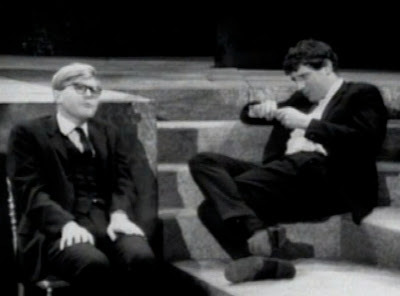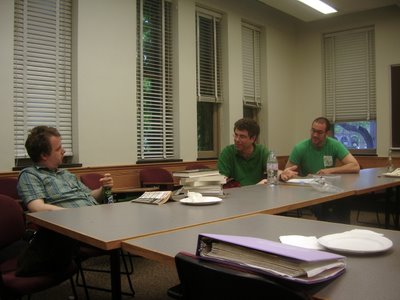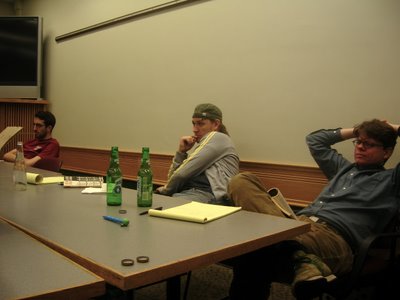Friday, September 26, 2008
Monday, February 11, 2008
Philosophical Imitations
Stanley Cavell, in "Austin at Criticism", writes:
"...it would be something of an irony if it turned out that Wittgenstein's manner were easier to imitate than Austin's; in its way, something of a triumph for the implacable professor" (114).
There are two well-known humorous imitations of Wittgenstein's manner, that might be taken to confirm Cavell's irony: Michael Frayn's "Fog-Like Sensations" and Jerry Fodor's Further Meteorological Addenda to PI. And, of course, there is Derek Jarman's Wittgenstein movie.
But Austin's manner has not completely avoided humorous imitation. There is a Beyond the Fringe sketch performed by Alan Bennett and Jonathan Miller in the 1960s that parodies the style of ordinary language philosophy:  (Bennett and Miller engaging in Ordinary Language Philosophy)
(Bennett and Miller engaging in Ordinary Language Philosophy)
A short excerpt:
Bennett: Other people have jobs to do, don't they? Um, what do people do these days... um, well, they...
Miller: Grow lawns, I believe.
Bennett: They do. They drive buses, or they sell ice cream. Or they play games.
Miller: Ah. More important.
Bennett: That's more important. Yes. We also games, you see. But we, as philosophers, we play language games. We play games with language. Language games...When you and I go onto the cricket pitch, we do so secure in the knowledge that a game of cricket is...well...it's in the offing, isn't it? It's not in progress, it's in the offing. But when we play language games, we do so rather to find out what game it is we're playing!
Miller: Ah, yes.
Posted by
Nat Hansen
at
2/11/2008
0
comments
![]()
Labels: Austin, humor, Wittgenstein
Thursday, June 01, 2006
Final Workshop Meeting of the Year: Sense and Sensibilia, Chapters X and XI


Tonight the workshop met for the last time this academic year. We discussed the last two chapters of Sense and Sensibilia and what we might read in the fall.
I will post a synopsis of our discussion of Austin shortly.
We decided on four possible books for the fall:
1. John Campbell, Reference and Consciousness
2. Fiona Cowie, What's Within: Nativism Reconsidered
3. David Chalmers, The Conscious Mind
4. David Velleman, Self to Self
-------------------------------------------------------------
Sense and Sensibilia, Chapters X and XI
David F. was on point tonight for the workshop. He got things going by asking three questions about the penultimate chapter in S&S:
- When Austin is arguing against the view that there are kinds of sentences that are incorrigible, he says that it is possible to have "complete confidence" in statements that one makes, but that the confidence is due not to the kind of sentence that is uttered, but to the "circumstances" when one makes them (114). He gives the following example of such a statement: "...if I watch for some time an animal a few feet in front of me, in a good light, if I prod it perhaps, sniff, and take note of the noises it makes, I may say, 'That's a pig'; and this too will be 'incorrigible', nothing could be produced that would show that I had made a mistake" (114). But, hold on--in what sense (if any) is it true to say, as Austin does here, that nothing could be produced that would show that I had made a mistake?
- When Austin considers Ayer's claim that "'material object' statements are as such not conclusively verifiable" (117), he argues that, in general, "statements about 'material things'" don't need to be verified. He gives as an example that a speaker who knows that he lives in Oxford cannot even count as verifying that he lives in Oxford (117-118). Fine, David said, but is this just something specific about verification? That is, would Austin's criticisms still be relevant if Ayer had said "justifiable" in place of "verifiable"?
- One of Austin's primary targets in chapter X is the idea that there is a class of sentences that have some kind of incorrigible status. These sentences, if they existed, might serve as a foundation for the rest of our knowledge (105). David asked whether, granting that there isn't a special class of sentences that have a special incorrigible status, is there still room for a foundation for knowledge? Maybe not an incorrigible foundation, but a foundation nevertheless? (David then quoted W. Sellars to the effect that without an empirical foundation our knowledge would be classed with rumors and hoaxes as support for the idea that we may want a foundation even if it isn't an incorrigible one.)
I said, in response to David's third question, that I thought Austin would be equally suspicious of a non-incorrigible foundationalism of the kind David attributed to Sellars. Why should there be a special kind of knowledge (observational knowledge) that is what all of our other knowledge rests on? Consider Austin's Oxford example (117-118): does my knowing that I live in Oxford "rest" on some foundation of observational knowledge? I think Austin would say that it is incorrect to say that it does. David suggested that self-knowledge (that one is in pain, for example) might also be a case where the idea of the knowledge as resting on an observational foundation seems out of place.
(There was some discussion at this point of McDowell's epistemological views, and whether he counts as a foundationalist (in some sense or other). I don't think we reached any substantial conclusions about that topic.)
Jason asserted, in response to the second question, that Austin has scored only a minor victory over Ayer by showing that not all statements must be "verified" to count as knowledge. He hasn't established the more interesting result that not all statements about 'material things' need to be justified if they're to count as knowledge. Jason went on to say that whenever we know something (like that we live in Oxford, say), we know it in some particular way (or ways). That way (or those ways) constitute a justification for what we know.
Will in particular argued against this point, claiming some inspiration from McDowell, but it seemed that by the end of the discussion Jason's assertion about there always being a way in which we know something hadn't been knocked down.
We then spent some time trying to figure out what Austin could have meant by saying that "nothing could be produced to show that [he] had made a mistake" in the situation he describes with the pig. We thought that actually it was pretty easy to come up with ways in which things could be produced to show that Austin had made a mistake even when he's been watching the animal a few feet in front of him, prodding it, sniffing it, and so on. Maybe it's a warthog in a pig-costume, for example. It would certainly be true that nothing could be produced to show that Austin had made a mistake if he knows that the animal he's looking at is a pig. But he doesn't give that as his reason for saying that nothing could show he had made a mistake. So we wondered about what was going on here, and we suggested some possible things Austin might mean by "nothing could be produced that would show I had made a mistake". But the most plausible was pretty underwhelming: we thought maybe Austin just meant "could" in some practical sense of "could", where for most practical purposes, you couldn't convince me that the thing in front of me wasn't a pig. Only in odd philosophical situations would that be possible, and this isn't such a case.
We then wrapped up the discussion of the Austin and concluded the workshop for this academic year. Huzzah.
Posted by
Nat Hansen
at
6/01/2006
0
comments
![]()
Labels: Austin, perception, Sense and Sensibilia, sense data
Wednesday, April 19, 2006
"Believing What the Man Says About His Own Feelings" and Chapters I-IV in Sense and Sensibilia
Tonight the workshop met for a double shot of J.L. Austin.
First Ben McMyler offered his revisionary reading of Austin's "Other Minds".
Then we discussed chapters I-IV of Sense and Sensibilia.
Jason gave a characteristically lucid and provocative account of Austin's way of responding to the argument from illusion.
The Argument From Illusion (As reconstructed by Jason)
(1) An example of a deceptive or illusory experience of an F is given.
(2) In such a case you see or experience something F.
(3) In such a case you're not seeing/experienceing a material F.
(4) Therefore, in such a case, you must be experiencing an F-ish sense datum (you must be experiencing something that is F or F-like).
------------------------------------------------------------
This first stage of the argument from illusion does not yet purport to establish the more ambitious claim that a subject is always experiencing a sense-datum, even in non-deceptive/illusory cases. To get to that conclusion, we need to add the following:
(5) A deceptive experience of an F can be indistinguishable from a veridical experience of an F.
(6) The deceptive and the veridical experiences, when indistinguishable, must have the same content (be of the same thing).
(7) Therefore, what we see/experience in both cases is a sense datum.
(8) Therefore, you only ever see an F indirectly.
Obviously, there are various problems with the argument as outlined above. Jason eventually wondered why Austin picks on the argument in the particular way(s) that he does in S&S. But first Jason said that he thought that the primary motiviation for invoking sense data is anti-skeptical, and that the argument from illusion is meant only as a secondary move to "buttress" the introduction of sense data.
How does Austin criticize the argument from illusion? Jason suggested two possible ways of reading Austin's criticisms. Either Austin simply tries to show that one or more of the premises of the argument is false, or, more ambitiously, he tries to show that all attempts to formulate the argument from illusion are confused.
I said that in his discussions of the bent stick, the mirror, and the mirage, Austin seems to criticize different parts of the argument. For example, Austin agrees that when one sees a straight stick placed in water, it makes sense to say that it looks bent. But, in the following passage, Austin seems to take issue with both (2) (3) in the argument given above:
"...we are told, in this case you are seeing something; and what is this something 'if it is not part of any material thing'? But this question is, really, completely mad. The straight part of the stick, the bit not under water, is presumably part of a material thing; don't we see that? And what about the bit under water?--we can see that too. We can see, come to that, the water itself. In fact what we see is a stick partly immersed in water..." (p.30).
In the mirror case, Austin clearly rejects (3), that when it "appears [that my body] is some distance behind the glass" (p.31), "I am not seeing a material thing". He also says that I see the mirror, and I see my body in the mirror, which suggests (to me, at least), that Austin is also rejecting premise (2), that when it appears that F (that my body is behind the glass), I must experience something F-ish (something behind-the-glass-ish). No--what I'm experiencing/seeing is the mirror and my body "in" the mirror.
Austin seems to grant (1-3) in the case of the mirage, but denies that it follows that the person experiencing the mirage is "experiencing sense-data" (p.32).
After I described the different ways Austin approaches the examples, Jason asked whether the key premise in the argument from illusion is (2). It seems possibly the least plausible premise in the argument. Focusing on it might have made shorter work of the argument from illusion. Why spend time picking apart the language of those arguing for sense-data rather than going straight to the heart of the argument?
Zack then said that he thought he could modify the argument to make premise (2) more plausible. If (2) is changed to read:
(2') In such a case you see or experience something
(2') might be something that Austin accepts. In each case Austin discusses, Austin clearly thinks that we are seeing something: a stick submerged in water; our reflection in a mirror; and a mirage. So it might turn out that rejecting premise (2) isn't enough to bring down the argument from illusion.
Jason then said that he thinks Austin's way of criticizing his opponents is excessively uncharitable. Instead of trying to give a rational reconstruction of Price or Ayer's arguments, Austin is content merely to point out their mistakes.
Jay, sympathizing with Jason, contrasted Austin's philosophical method with Wittgenstein's. While Wittgenstein treats the confusions of the philosopher as confusions that we are all prone to, Austin treats them as careless mistakes.
(This difference was disputed, to some extent, by some members of the workshop, including I think Ben and maybe David F.)
We meet again in two weeks to discuss more of Sense and Sensibilia.
Posted by
Nat Hansen
at
4/19/2006
1 comments
![]()
Labels: Austin, perception


